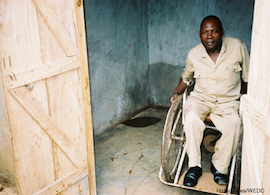Difference between revisions of "Accessible - Internal Space"
From Akvopedia
(Published from sandbox) |
(No difference)
|
Revision as of 00:47, 29 January 2015
| Think about: who will use the toilet, and how much space they will need. Level 1: Space for users who can stand and enter using support rails, or blind users. |
| Construction | Advantages | Disadvantages | Improvements / variations | Cost / labour |
| Traditional round superstructure, cement seat, wooden handrail each side, curtain for privacy | Level 1 access: enough space for this household, including a user who needs to use handrails for support. |
|
|
Medium |
| Entrance corridor, with wall on left in front of latrine and a gap between corridor and toilet. | Level 2 access: wheelchair can enter and park in corridor. User can transfer to the toilet using handrails fixed to the inside wall. |
|
Install a door or curtain to hide the wheelchair from view | Medium to high |
| Spacious toilet cubicle, with drop hole located in the corner to provide maximum usable space |
|
Handrails on the inside to provide support when transferring to the toilet | High |
Acknowledgements
- Content and images: Compendium of accessible WASH technologies WaterAid.



